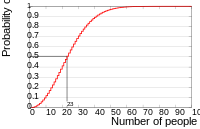
Photo from wikipedia
A key result of classical information theory states that if the rate of a randomly generated codebook is less than the mutual information between the channel’s input and output, then… Click to show full abstract
A key result of classical information theory states that if the rate of a randomly generated codebook is less than the mutual information between the channel’s input and output, then the probability that that codebook has negligible error goes to one as the blocklength goes to infinity. In an attempt to bridge the gap between the probabilistic world of classical information theory and the combinatorial world of zero-error information theory, this work derives necessary and sufficient conditions on the rate so that the probability that a randomly generated codebook operated under list decoding (for any fixed list size) has zero error probability goes to one as the blocklength goes to infinity. Furthermore, this work extends the classical birthday problem to an information-theoretic setting, which results in the definition of a “noisy” counterpart of Rényi entropy, analogous to how mutual information can be considered a noisy counterpart of Shannon entropy.
Journal Title: IEEE Transactions on Information Theory
Year Published: 2021
Link to full text (if available)
Share on Social Media: Sign Up to like & get
recommendations!